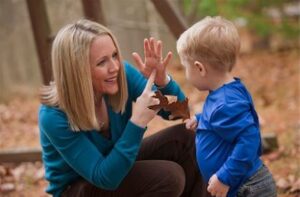Hearing loss or deafness
Hearing loss or deafness
What is deafness?
 Deafness, or hearing impairment, happens when one or more parts of the ear aren’t working effectively – it can be temporary, permanent, on one side, or affecting both ears. According to the Royal College of Speech and Language Therapists, it is estimated that around one in five people (12 million) in the UK are deaf, and over 50,000 of these individuals are children.
Deafness, or hearing impairment, happens when one or more parts of the ear aren’t working effectively – it can be temporary, permanent, on one side, or affecting both ears. According to the Royal College of Speech and Language Therapists, it is estimated that around one in five people (12 million) in the UK are deaf, and over 50,000 of these individuals are children.
How is deafness assessed?
Routine hearing tests are offered to newborn babies and children to identify any problems early on in their development. Early testing ensures that any problems are picked up and managed as early as possible.
If you are concerned about your child’s hearing, speak to your health visitor or GP in the first instance. They will be able to refer your child for a hearing test to identify whether their hearing loss is mild, moderate, severe or profound.
In Bradford we aim for all children with moderate, severe and profound hearing losses to then be assessed by a specialist therapist from the Deafness and Hearing Impairment team.
The NHS website has more information about Hearing tests for children.
Types of deafness
This video of a Flintstones cartoon takes you through the different sounds experienced by people with different levels of hearing loss.
This video offers another hearing loss simulation as two people talk in a restaurant.
How you can help a child with hearing loss
In this video a mother talks about her baby being diagnosed with severe hearing loss and what’s helped her.
This video gives an idea of what it’s like for a child with mild hearing loss. It was made for teachers, but the tips to help a child with mild hearing loss to understand what you are saying are useful for all.
The role of the speech and language therapist
Developing good language and communication skills right from birth is very important for children with hearing loss. Learning to play, listen and interact will all have a big impact on speech and language development.
If you have a child with hearing loss, a speech and language therapist may help to support you by:
- working with other professionals such as teachers of the deaf, audiologists and educational professionals to help advise on the best language environment for your child
- assessing and monitoring your child’s speech and language development
- giving you advice and guidance about the best ways to communicate with your child
- providing ideas and modelling activities to help develop listening, speech and language skills
- contributing reports that may be part of a multiagency management plan for your child
- providing therapy to develop your child’s speech and language skills.
How refer a child to Bradford Speech and Language Therapy Service
You can refer your child using the referral form in the ‘what to expect’ tab on the Speech and Language Therapy – children and young people home page. Your teacher of the deaf can also refer your child to our service.
More useful resources
The National Deaf Children’s Society is a UK charity with a range of resources to support families with language and communication. They have a freephone helpline 0808 800 8880.
Yorkshire Auditory Implant Service is based at the Listening for Life Centre at Bradford Royal Infirmary. It supports children with severe or profound hearing loss who have cochlear implants.
Contact a Family is a UK charity working with families who have disabled children, including children with hearing loss. They have a freephone helpline 0808 808 3555 for information, support and advice, a resource library and a closed facebook group.